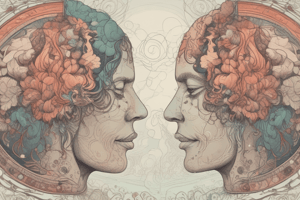Podcast
Questions and Answers
Which of the following is NOT a theory of personality development?
Which of the following is NOT a theory of personality development?
- Social-Learning
- Genetics (Trait)
- Cognitive Behavioral
- Social (correct)
- Humanistic
- Behavioural
- Psychoanalytic
- Cognitive
According to the Cognitive approach to personality, what influences our behavior?
According to the Cognitive approach to personality, what influences our behavior?
- Cultural influences
- Our thoughts (correct)
- Past experiences
- Our feelings
- Environmental factors
- Our genetics
Who is credited with the Cognitive Theory of Personality?
Who is credited with the Cognitive Theory of Personality?
Aaron Beck
Which two dimensions of personality are discussed in the text?
Which two dimensions of personality are discussed in the text?
Which of the following is NOT a technique used in Cognitive Therapy?
Which of the following is NOT a technique used in Cognitive Therapy?
What are the core components of the Cognitive Triad?
What are the core components of the Cognitive Triad?
____ thoughts are involuntary and unintentional, and often occur at a pre-consciousness level.
____ thoughts are involuntary and unintentional, and often occur at a pre-consciousness level.
Cognitive distortions refer to systematic errors in our reasoning processes.
Cognitive distortions refer to systematic errors in our reasoning processes.
What is NOT an example of a cognitive distortion?
What is NOT an example of a cognitive distortion?
Beck's cognitive theory of depression has received little empirical support.
Beck's cognitive theory of depression has received little empirical support.
Match the following cognitive distortions to their descriptions:
Match the following cognitive distortions to their descriptions:
Which of the following statements accurately describes the relationship between schemas, automatic thoughts, and cognitive distortions?
Which of the following statements accurately describes the relationship between schemas, automatic thoughts, and cognitive distortions?
Flashcards
Cognitive Approach to Personality
Cognitive Approach to Personality
Personality is shaped by how we think about the world and ourselves. Our thoughts influence our feelings and behaviours.
Aaron Beck
Aaron Beck
Developed Cognitive Therapy, a theory suggesting how thoughts influence behaviour.
Schemas
Schemas
Fundamental beliefs and assumptions about the world. These shape one's concepts of self, others, and the world.
Automatic Thoughts
Automatic Thoughts
Signup and view all the flashcards
Cognitive Distortions
Cognitive Distortions
Signup and view all the flashcards
Cognitive Triad
Cognitive Triad
Signup and view all the flashcards
Sociotropy
Sociotropy
Signup and view all the flashcards
Autonomy
Autonomy
Signup and view all the flashcards
Cognitive Therapy
Cognitive Therapy
Signup and view all the flashcards
Arbitrary Inference
Arbitrary Inference
Signup and view all the flashcards
Selective Abstraction
Selective Abstraction
Signup and view all the flashcards
Overgeneralization
Overgeneralization
Signup and view all the flashcards
Magnification/Minimization
Magnification/Minimization
Signup and view all the flashcards
Personalization
Personalization
Signup and view all the flashcards
Dichotomous Thinking
Dichotomous Thinking
Signup and view all the flashcards
Cognitive Therapy Techniques
Cognitive Therapy Techniques
Signup and view all the flashcards
Study Notes
Cognitive-Behavioral Theory of Personality (Aaron Beck)
- Beck's theory posits that behavior is influenced by thought processes.
- Personality develops based on how individuals process information about the world and themselves.
- Thoughts impact feelings, which in turn affects behavior.
Example Theorists
- Psychoanalysis: Sigmund Freud
- Neo-psychoanalytic: Karen Horney (Neurotic Trends), Alfred Adler (Individual Psychology)
- Behavioral: B.F. Skinner (Reinforcement Theory)
- Cognitive: Aaron Beck (Cognitive Theory)
- Humanistic: Carl Rogers (Self-Actualization), Martin Seligman (Positive Psychology)
- Genetics (Trait): McCrae & Costa (Five-Factor Theory), Marvin Zuckerman (Sensation Seeking)
- Social-Learning: Julian Rotter (Locus of Control), Martin Seligman (Learned Helplessness)
The Life of Aaron Beck (1921-2021)
- Born in Providence, Rhode Island in 1921.
- His parents were Russian Jewish immigrants.
- Beck's mother experienced significant depression after the death of their daughter.
- His personal struggles with anxiety prompted him to develop cognitive models.
- His father encouraged his interest in science and nature.
- His study of psychoanalytic theory prompted the development of the concept that sadness is a response to thoughts about loss.
- Patients with depression and anxiety were discovered to have maladaptive thought patterns.
Schemas, Automatic Thoughts, and Cognitive Distortions
- Schemas: Fundamental core beliefs and assumptions about the world, developed early in life from experiences.
- They form concepts of self, others, and the world. Schemas can be adaptive or maladaptive.
- Example: "Unless others approve of me, I am worthless".
- Automatic Thoughts: Involuntary, unintentional thoughts that emerge pre-consciously. These can be self-critical or supportive. Example: "If I fail this test, I'm stupid".
- Controlled Thoughts: Intentional, voluntary thoughts that can be regulated. Example: "I did not study enough for the test".
- Cognitive Distortions: Systematic errors in thinking. These can appear during stress and unrealistic schemas. Common examples include: Arbitrary Inference, Selective Abstraction, Overgeneralization, Magnification & Minimization, Personalization, Dichotomous Thinking.
Cognitive Triad
- Perceptions of self, the world, and the future.
Dimensions of Sociotropic and Autonomous Dimensions of Personality
- Sociotropic: Dependency on interpersonal relationships, and a need for closeness and nurturance.
- Autonomous: Independence, goal setting, self-determination, and self-imposed obligations.
- Most individuals display both sociotropic and autonomous tendencies.
Cognitive Therapy
- Techniques for removing systematic biases in thinking.
- Aims to correct faulty information processing.
- Examples: challenging thinking, decatastrophizing, role-playing
Research in Beck's Theory
- Beck Depression Inventory (BDI) has high empirical support for the cognitive theory of depression.
- Cognitive therapy is effective for various mental health challenges including panic disorders, OCD, substance abuse, personality disorders, marital issues, sex offenses, schizophrenia, and suicide prevention.
Studying That Suits You
Use AI to generate personalized quizzes and flashcards to suit your learning preferences.




